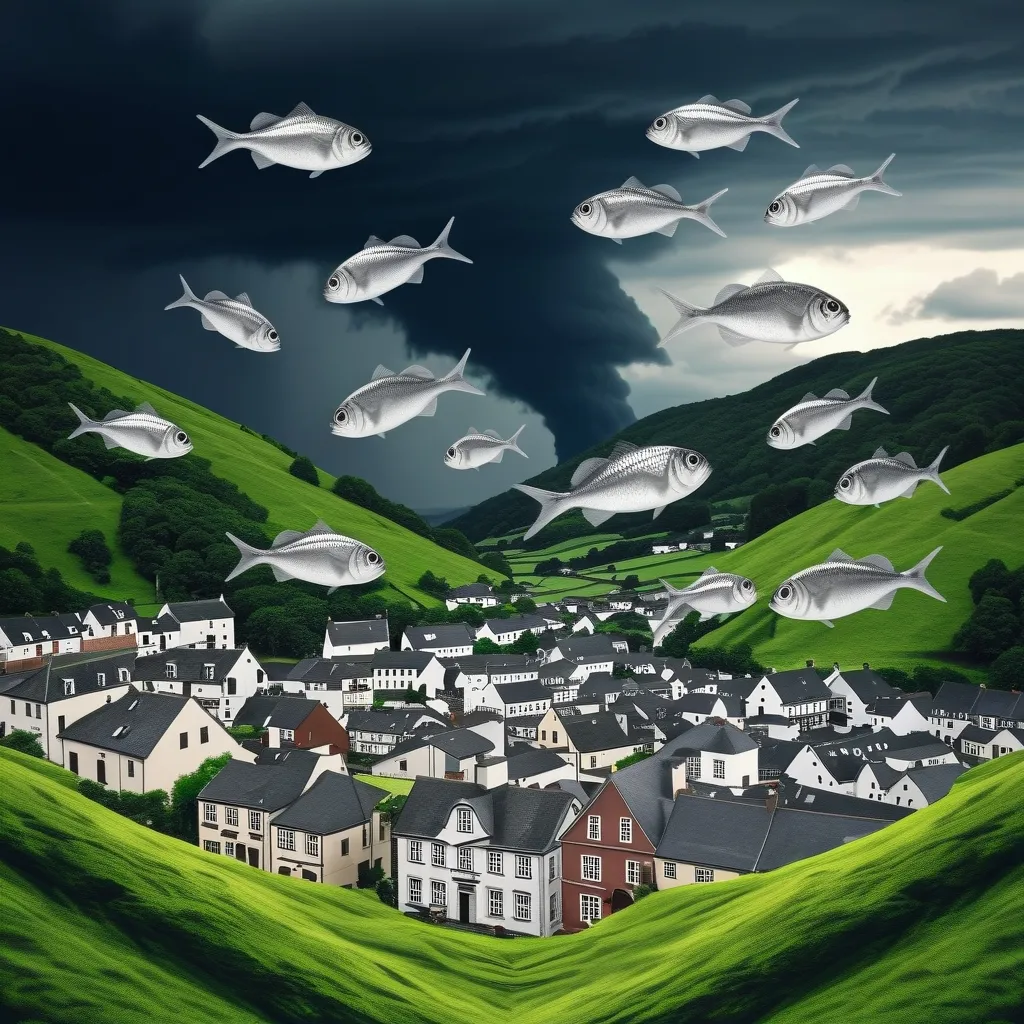The Fish Rain of Yoro: A Miraculous Mystery
In the heart of Honduras, a small town called Yoro experiences something truly extraordinary. Imagine walking down the street when suddenly, fish start falling from the sky! It sounds like something out of a fantasy novel, but for the people of Yoro, it’s a reality they’ve lived with for over a century.
This bizarre phenomenon, known as “Lluvia de Peces” or “Rain of Fish,” happens a few times each year, usually in May or June. It’s not just a few fish here and there - we’re talking hundreds of small, silver fish scattered across the town’s streets. It’s enough to make you wonder if you’ve stepped into some kind of alternate universe!
Now, you might be thinking, “Fish falling from the sky? Come on, that’s impossible!” And you’d be right to be skeptical. But here’s the thing - this event has been witnessed by countless people, including scientists who’ve come from far and wide to study it. It’s as real as it gets, folks.
The legend behind this fishy phenomenon is pretty fascinating. Picture this: it’s the 1860s, and a Spanish priest named Father José Manuel de Jesús Subirana is worried sick about the hungry people of Yoro. So, he does what any good priest would do - he prays. But this isn’t just a quick bedtime prayer. Oh no, this guy prays for three whole days and nights! Talk about dedication, right?
According to the locals, Father Subirana’s marathon prayer session paid off big time. A dark cloud appeared in the sky, and suddenly, fish started raining down. Just like that, the hungry people of Yoro had food. It’s like the ultimate heavenly delivery service!
Ever since then, the people of Yoro have celebrated this miracle with a huge festival. They parade through the streets carrying statues of Father Subirana, and there’s a carnival atmosphere that would put Rio to shame. It’s clear that for the folks in Yoro, this isn’t just some weird weather event - it’s a sign that someone up there is looking out for them.
But let’s get real for a second. Fish don’t just fall out of the sky for no reason, right? Scientists have been scratching their heads over this one for years, trying to come up with a logical explanation. And boy, have they come up with some doozies!
One theory involves waterspouts - imagine a tornado, but over water. The idea is that these waterspouts could suck up fish from the Atlantic Ocean and drop them over Yoro. Sounds plausible, doesn’t it? Well, there’s just one tiny problem - Yoro is about 125 miles inland. That’s one heck of a fish delivery route!
Another theory came from a team of National Geographic scientists who witnessed the event in the 1970s. They reckon the fish aren’t falling from the sky at all. Instead, they believe these fish live in underground rivers beneath Yoro. When it rains heavily, the fish get pushed up to the surface and end up stranded on the streets. It’s like a subterranean fish party that got out of hand!
This underground fish theory gets even more interesting when you look at the fish themselves. They’re completely blind! Now, unless fish have suddenly developed an aversion to sunlight, this suggests they’ve been living in darkness for a long time. Underground rivers, anyone?
But wait, there’s more! Some scientists think it’s all down to good old-fashioned flash floods. Picture this: a massive storm hits Yoro, flooding the streets. As the water rushes through the town, it picks up fish from nearby rivers and streams. When the flood recedes, voila! Fish on the streets. It’s like nature’s version of a seafood delivery service.
Now, you might think that with all these scientific explanations, the people of Yoro would lose faith in the miracle. But nope! They’re sticking to their guns. For them, the Fish Rain is a sign of divine intervention, a yearly reminder that miracles can happen.
And who can blame them? In a world where we’re constantly trying to explain everything with logic and reason, isn’t it nice to have a little mystery? To believe in something magical?
The Fish Rain has become such a big part of Yoro’s identity that they even have an annual festival for it. The Festival de Lluvia de Peces kicks off with a parade that would put Mardi Gras to shame. People dress up, dance in the streets, and carry giant effigies of Father Subirana. It’s like the whole town turns into one big party!
But the Fish Rain isn’t just about having a good time. For many people in Yoro, it’s a lifeline. In a region where food can sometimes be scarce, the annual appearance of fish is seen as a blessing. It’s a source of protein that falls right into their laps - or onto their streets, to be more precise.
Interestingly, Yoro isn’t the only place where strange things fall from the sky. There have been reports of “animal rain” from all over the world. In 2010, a small town in Australia’s Northern Territory experienced its own fish rain during a severe storm. It’s like Mother Nature decided to spice things up a bit!
These events remind us that our world is full of mysteries. Just when we think we’ve got it all figured out, something comes along to shake up our understanding. It’s humbling, isn’t it?
The Fish Rain of Yoro is more than just a weird weather phenomenon. It’s a symbol of hope, a testament to faith, and a reminder of the power of community. Whether you believe it’s a miracle or a quirk of nature, you can’t deny that it’s pretty darn cool.
So, next time you’re planning a vacation, why not consider a trip to Yoro? Who knows, you might just witness fish falling from the sky. And even if you don’t, you’ll get to experience a community that has turned an unusual event into a celebration of life, faith, and resilience.
In the end, the Fish Rain of Yoro teaches us an important lesson. Sometimes, it’s okay not to have all the answers. Sometimes, it’s enough to simply marvel at the wonders of our world, to embrace the mystery, and to celebrate the extraordinary events that bring us together.
After all, in a world that can often feel divided, isn’t it wonderful to think that somewhere out there, an entire town comes together each year to celebrate fish falling from the sky? Now that’s what I call a silver lining - or should I say, a silver fish lining!






